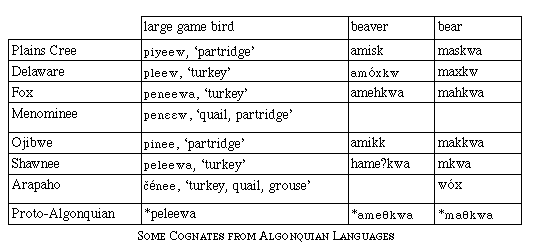
| Some Algonquian Cognate Vocabulary |
| Home | Grammar Contents | Previous | Next |
The following chart provides a few words from several Algonquian languages (note that the letter x stands for the sound at the end of the German pronunciation of Bach; the Greek letter theta represents the first sound of the English word thistle; c with a hat is similar to the sound spelled ch in English church; the question mark-like character is glottal stop):

Since the relationship between a word’s form (pronunciation) and its meaning is essentially an arbitrary one, when words having similar meanings sound similar in different languages, one possible explanation is genetic relationship, that is, that the languages have come from a common parent language, and have as a result inherited common vocabulary and grammar. Compare the words for ‘bear,’ above, with those of some Germanic languages: English, bear; Swedish, björn; Danish, Bjørn; Dutch, beer; German, Bär. These words share obvious similarities. An examination of the words in some Romance languages yields different results: French, l’ours; Spanish, el oso; Portuguese, o urso; Italian, l’orso. In each case the relationship between the word and the thing is arbitrary, that is, there is nothing about bears that suggests that bear or urso or mkwa is somehow a more natural or appropriate set of sounds to use to identify this animal than any of the other languages’ sounds. So when groups of languages show extensive, structured similarity between their vocabularies, one possibility is that they have all inherited their vocabularies from a common “mother” language. Extensive relations such as these among the Algonquian languages. Words in daughter languages that they have each inherited from the same word in the mother language are called cognates.